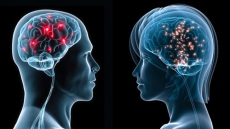Bad cholesterol has just become worse. Known to cause heart disease and hardening of the arteries, it has now been linked with a cell pathway that promotes cancer.
Researchers at the University of Illinois in Chicago have described a new role for cholesterol in the activation of a cellular signalling pathway that has been associated with cancer.
"Our research points to a new regulatory role for cholesterol. It also presents an exciting new therapeutic target for suppressing a key cell signalling pathway to treat or prevent cancer," explained principal investigator Wonhwa Cho, a professor of chemistry at University of Illinois.
Cells employ thousands of signalling pathways to conduct their functions.
"Canonical Wnt" signalling is a pathway that promotes cell growth and division and is most active in embryonic cells during development.
Overactivity of this signalling pathway in mature cells is thought to be a major driver in the development of cancer.
Cho and his colleagues discovered a binding site for cholesterol on a protein called "Dishevelled".
"Dishevelled" is involved in "canonical Wnt" signalling that plays a role in processes like cell movement and organisation.
The researchers found that when cholesterol is bound to "Dishevelled", the signal continues along the canonical Wnt signalling pathway.
Without cholesterol, the signalling cannot occur.
"Our research provides a mechanism for how cholesterol promotes pathways that lead to cancer," Cho noted.
"A drug that interferes with the binding of cholesterol to Dishevelled," Cho said, "may be effective against cancers that are driven by canonical Wnt signalling."
Such cancers include colon cancer, melanoma, breast cancer and lung cancer.
The findings were reported in the journal Nature Communications.






